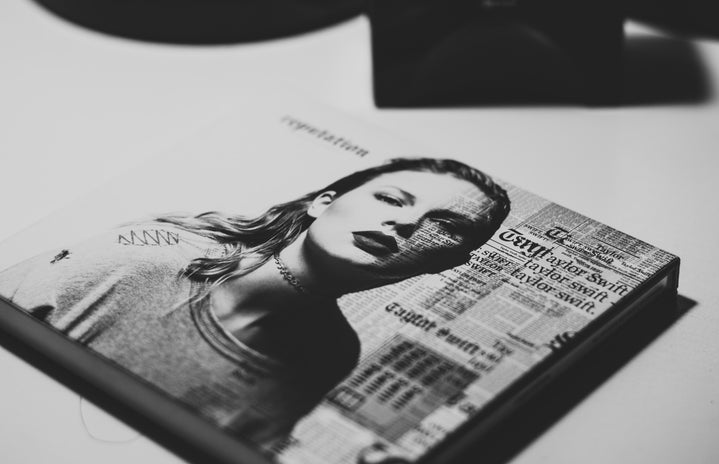From the opening sonic boom of Taylor Swift’s sixth studio album, “Reputation” (titled in lowercase) commands your attention in major ways. It’s an album that covers the bubbling over of grievances, the spark hidden from the public that has now become a five-alarm fire, and the construction (and destruction) of the self in a ground-shaking manner. So why is it one of the albums consistently ranked lowest by fans?
Ask a group of Swifties what their favorite Taylor Swift album is and almost certainly you’ll have to wait before you meet a “Reputation” lover. It’s partly for this reason that I waited so long before listening to “Reputation” – if fans felt so apathetic or hostile towards it, why listen to it? – and opted instead for the bright pop of “Lover” or the comforting, transitory sound of “Red.” At the urging of my two best friends, I finally gave in and found “Reputation” to be everything I’d been missing in my music library. It’s one of the most impeccably produced albums I’ve ever heard (the pause on “Dress” when Swift whispers “Say my name and everything just stops” is the perfect embodiment of this). It’s a swirling mix of love, hope, anger, cynicism, and connection; it’s autobiographical and fictionalized; it’s gentle and sonorous. It’s criminally underrated.
All of Taylor Swift’s albums read like carefully constructed fairytales and confessionals, but there’s something unique about “Reputation.” Her ability to combine make-believe (Swift has even said that the album was inspired by “Game of Thrones”) and personal experience in a seamless album experience is a testament to her talent. She’s regarded as one of the best lyricists of our time for her lyrical and emotional range, and yet “Reputation” is discounted from many examples of her genius. It’s a shame – “Reputation” has a range that spans quiet pleas in “New Year’s Day” (“Don’t read the last page / But I stay;” Please don’t ever become a stranger / Whose laugh I could recognize anywhere”); explosive accusations and antagonism in “I Did Something Bad” and “Look What You Made Me Do” (”If a man talks shit / Then I owe him nothing / I don’t regret it one bit / Cause he had it coming;” “I’ll be the actress starring in your bad dreams”); an overall marked shift as Swift continues to move from a naive American sweetheart to an adult swept into the spotlight in dramatic ways. It’s songs like “Getaway Car” and “Dress” that give way to Swift’s later three albums, with the mature foundation for “Lover” explored in “Dress” (“All of this silence and patience / Pining and anticipation / My hands are shaking from holding back from you;” “I don’t want you like a best friend / Only bought this dress so you could take it off / Carve your name into my bedpost”) and “Folklore”’s delicately plotted characters tested in “Getaway Car” (“It was the great escape, the prison break / The light of freedom on my face / But you weren’t thinking / And I was just drinking”).
Swift’s classic love songs aren’t forgotten, though they take a new angle. “Delicate” acknowledges the impact drama can have when exploring new relationships (“This ain’t for the best / My reputation’s never been worse / So you must like me for me”) and “Call It What You Want” provides praise for Swift’s lover while also asserting Swift’s own autonomy in the pace of the relationship (“My baby’s fit like a daydream / Walking with his head down / I’m the one he’s walking to / So call it what you want;” “I want to wear his initial on a chain ‘round my neck, chain ‘round my neck / Not because he owns me / But ‘cause he really knows me”). It’s this recognition that love isn’t as easy to understand as cliche love songs may say, combined with the backdrop of Swift’s booming vocals and the trademark Jack Antonoff zing, that shows us how Swift has changed in her sixth album.
Perhaps this is part of what makes fans so disenchanted with “Reputation” – it’s an entirely new way of approaching her music, marking more of a shift than even her genre swaps. Swift recognizes her age, her maturity, and her unusual life circumstances and translates them to both the lyrics and the sounds of “Reputation.” She’s honest about her role in drama and her frustrations at such experiences, but she doesn’t stop hoping for some semblance of peace. It’s an album that is something both familiar and unfamiliar, a construction of some new area of life that leaves fans uneasy – Swift’s never been more honest, but it’s not the honesty that her fans had expected. Does that make it any less applicable? Does it make it any less of a masterpiece? “Reputation” should be heralded as Taylor Swift at her best – able to combine emotion, sound, and lyrics to create a firework on the music scene.


